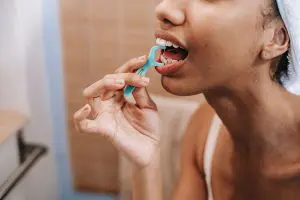We know it may be frustrating when your dentist hands out floss at Halloween time instead of candy. You want chocolate and we’re giving out utilitarian dental aids. Still, we do it because flossing is SO essential for your overall dental health. As Davis County family dentists, we can’t recommend flossing highly enough.
The two best habits you can have for your oral health are to brush and floss every day. The American Dental Association recommends brushing at least twice daily and flossing once daily. Both are easy to do, and when you start to make them part of your daily routine, it becomes a natural way to start and end your day.

(Sora Shimazaki / pexels)
Flossing is vital in addition to brushing because it removes plaque from areas your toothbrush may not be able to reach. No matter how you floss, flossing is better than not flossing. But if you’re going to floss, you may as well do it right! Here are some common flossing mistakes to avoid.
1. Don’t Be Too Rough
Be gentle when you floss your teeth. Harshly flossing can lead to bleeding gums and other dental issues. Take your time and floss softly. Even when you take your time, the flossing process doesn’t take long.
2. Don’t Apply Pressure Directly to the Gums
Be careful not to apply too much pressure to your gums with your floss—the purpose of flossing is to get between each tooth and remove plaque from the gums. When flossing your bottom teeth, you should hug the base of your tooth and move the floss back and forth and upward to move the plaque up and away with every movement. Likewise, when flossing the upper teeth, focus on bringing the plaque down and out of the teeth.
Try not to put physical pressure on your gums; it will wear on your gum tissue and cause pain and possible bleeding. Putting pressure on your gums every time could cause long-term damage and possibly form a furrow or cleft.
3. Don’t Rely on Flossing Alone
Flossing is vital but should never be your sole dental cleanser. Brushing twice daily for at least two minutes must be paired with daily flossing to maintain good dental hygiene. We also encourage mouthwash after brushing and flossing. Include professional dental cleanings every six months, and your dental issues will be few and far between.
4. Don’t Rush It
Even when you take your time, flossing doesn’t take more than a few minutes. Do it suitable for proper cleaning. Start by breaking off about 18 inches of your favorite dental floss. Tightly hold the floss between your thumbs and forefingers with a good grip. Guide your floss between your teeth and hug the tooth while gently rubbing back and forth, up and down. As mentioned earlier, never apply pressure to the gums. Throw the floss away when you’re finished. Never reuse floss.
5. Don’t Go Overboard
You only need to floss once a day. More often than that is unnecessary and could potentially cause more harm than good. Flossing more frequently than once a day can cause sensitivity and damage. Choose morning or night and stick to it every day.
6. Don’t Use the Same Section of Floss for All Your Teeth
If you use the same section of floss for your whole mouth, you spread bacteria around your mouth; yuck! Use a new section of floss each time you floss between teeth, and you’ll adequately loosen and remove plaque without putting the plaque back in between other teeth.
7. Don’t Skip the Back Teeth
It can be easy to become lazy and get in the habit of only flossing the teeth people can see when you smile. However, neglecting those back teeth that are so heavily exposed to food when chewing could lead to cavities, receding gums, and a host of other problems. Floss between every single tooth for a healthier mouth. Don’t forget to also floss behind the back teeth.
Start today if you haven’t made flossing a part of your daily routine! We’re not kidding when we talk about how vital it is to keep plaque away. The more you floss, the easier it is.
If you have children, try to instill the importance of brushing and flossing in them early. When children are very young, forming good habits is crucial. Even if they have gaps between their teeth, helping them develop the habit of flossing will carry with them for the rest of their lives. The same goes for dental visits. Teach your children that visiting the dentist twice a year is normal and essential. It’s never too late to start caring about your dental hygiene!
